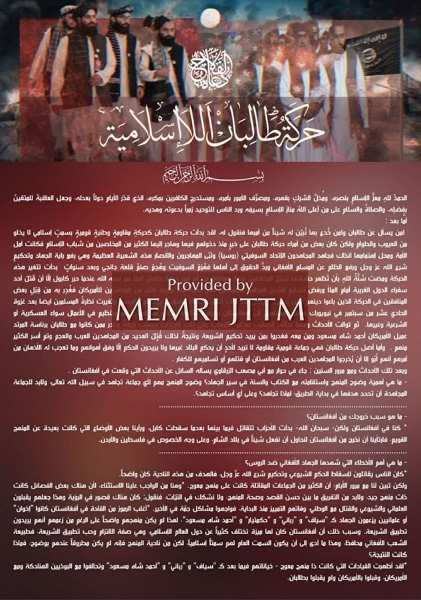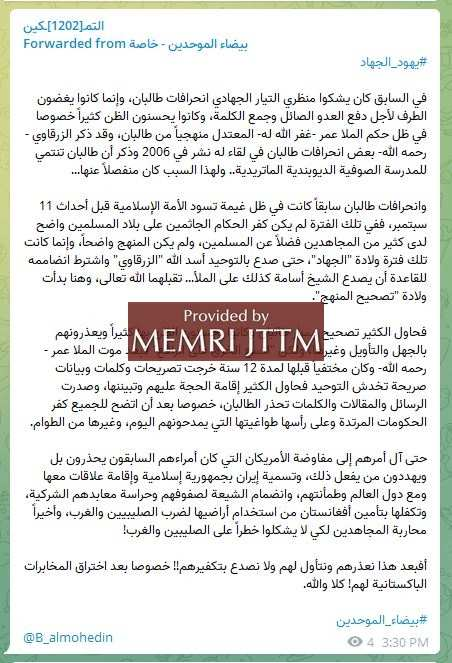The following report is now a complimentary offering from MEMRI’s Jihad and Terrorism Threat Monitor (JTTM). For JTTM subscription information, click here.
Following multiple attacks targeting the “apostate Taliban militia” in Afghanistan,[1] the Islamic State (ISIS) affiliate in Afghanistan, known as the Islamic State Khorasan Province (ISKP), continued to ramp up its operations against the Taliban, claiming responsibility for two more attacks in a single day. The escalation of ISKP attacks against the Taliban followed the U.S. withdrawal from Afghanistan as ISKP seeks to compete with the Taliban and undermine their jihad.
Furthermore, ISKP also claimed two attacks within Pakistan, targeting a policeman and an alleged spy for Pakistani intelligence, thus expanding its operations in Pakistan’s Khyber Pakhtunkhwa province from Peshawar, Bajaur, to Kohat.
In the first statement[2] posted on Telegram on September 20, 2021, ISIS claimed two improvised explosive devices (IED) attacks that killed a total of six Taliban fighters and wounded three others in the eastern Nangarhar province in Afghanistan.
According to the statement, ISIS claimed that its “caliphate soldiers” detonated an explosive device on a vehicle belonging to “the apostate Taliban militia” in the ninth district in Nangarhar, killing four Taliban fighters, wounding three others, and damaging the vehicle. The statement added that ISIS fighters also detonated another explosive device on Taliban fighters who gathered at the site of the attack, killing two other fighters.

On September 21, ISIS released a statement[3] claiming an IED attack on a vehicle belonging to “the apostate Taliban militia” on September 20 in Mazar Dara in Nurgal district in the eastern province of Kunar. The statement also stated that the attack damaged the vehicle and wounded two Taliban fighters.

ISKP Expands Operations Within Pakistan’s Khyber Pakhtunkhwa Province
ISKP also claimed responsibility for the September 20 IED attack that critically wounded a “spy for the apostate Pakistani intelligence” in the Mamund area of Bajaur district in Khyber Pakhtunkhwa province in Pakistan.

Another attack was carried out by ISKP on September 19 in the village of Dhal Behzadi in Kohat in the Khyber Pakhtunkhwa province in Pakistan that resulted in the killing of a member of the “apostate” Pakistani police.

Pro-ISIS Outlets Celebrate Escalating Attacks On Afghan Taliban, Predict ‘Soon, Allah Willing, The Land Of Afghanistan Will Be Under The Rule Of The Islamic State”
The pro-ISIS Al-‘Adiyat Foundation published a poster[4] celebrating the rise on ISIS attacks against Taliban in Afghanistan. The poster included ISIS’s claim of responsibility for killing six Taliban fighters in Nangarhar. It also included a statement by slain ISIS spokesman Abu Al-Hasan Al-Muhajir in which he urged ISIS fighters to avoid being “soft” on their enemy.

Another poster released on September 21 by the same outlet predicted that “soon, Allah willing, the land of Afghanistan will be under the rule of the Islamic State.”

These two attacks followed multiple attacks by the ISKP against the Afghan Taliban on September 18 and 19, which killed 14 Taliban members and wounded 26 others, mostly in the city of Jalalabad, the capital of Nangarhar province, where there is a strong ISIS presence.[5] These attacks were the first ISIS attacks in Afghanistan since the August 26 suicide bombing at the Kabul airport, which killed more than 180, including 13 U.S. servicemen, and the August 30 Katyusha rocket attack at the airport.[6]
ISIS accuses the “apostate Taliban militia” of being a product of Pakistani intelligence and claims that the Taliban have “deviated from their original path.” ISIS also accuses the Taliban of deviating from their original position by establishing relations with countries like Russia, China, and Iran, and of waging a war against the Islamic State on behalf of the West, thus viewing the conflict as “a battle of monotheism.” A September 2 editorial in ISIS weekly Al-Naba’ declared that the U.S. withdrawal will usher in “another stage in the war against Islam” which will now be led by the Taliban fighting ISIS at the behest of the West, and threatened that the “fighting and conflict will be intensified between the Caliphate soldiers and the soldiers of patriotism and nationalism.”[7]
Pro-ISIS media outlets intensified their criticism of the Taliban, portraying them as “traitors” who collaborated with the West to fight Islam and ISIS fighters. On September 17, pro-ISIS media outlet Du’at Al-Falah (“Preachers Of Success”) published[8] a two-page article, titled “The Truth About The Non-Islamic Taliban Movement,” which stated that although the Taliban started out as a national movement that had its problems, many of its leaders were good and true Muslims joined it and it was the hope of the Islamic nation, but over time it changed and today its leaders are “traitors” who are fighting the religion of Allah after the “peace agreement with the Americans.” The article cited slain militant commander Abu Mus’ab Al-Zarqawi as saying that he left Afghanistan after it was obvious that so many fighting groups were adopting a “crooked methodology.”
The author further compared the Taliban today to Al-Shabab, whose leader and founder Mukhtar Robow, also known as Abu Mansur, declared at the start that the group was fighting to enforce the shari’a, but later he put forward his candidacy for president of the country and began to “right his religion and the mujahideen.”

Describing the Taliban as “the Jews of jihad,” the pro-ISIS Telegram channel Bayda’ Al-Muwahhideen also published[9] on September 20 a post highlighting the deviations committed by the Taliban, especially after the death of Taliban founder Mullah Omar, such as entering into negotiations with the U.S., calling Iran an Islamic republic, allowing Shi’ite Afghans to join their ranks and guarding their “polytheist temples,” and assuring “the West and the Crusaders” that it would not allow the mujahideen to launch attacks from Afghanistan. The channel also condemned Taliban for waging war against ISIS and accused it of being “infiltrated” by Pakistani intelligence.

For their part, the Taliban responded to ISIS claims. In an article published in the Taliban’s monthly magazine, Al-Somood, which was released on August 31, 2021, writer Karim Al-Nakadi argued that the views held by the Taliban today are consistent with the Taliban of the past, and responded to several accusations made against the Taliban, including the claim that they fight ISIS on behalf of the West as well as their diplomatic relations with China, Russia, Qatar, and Iran.[10] Al-Nakadi stressed that there “is no difference between today’s Taliban and the Taliban of the past, and their current policy is a continuation of their older policy, since they assumed power in Afghanistan in 1996. Those who claim otherwise are either lacking in knowledge of the ideology of the Taliban since their inception, or maintain the wish that the Taliban had deviated, so they can unleash the arrows of their deep hatred of them.”
